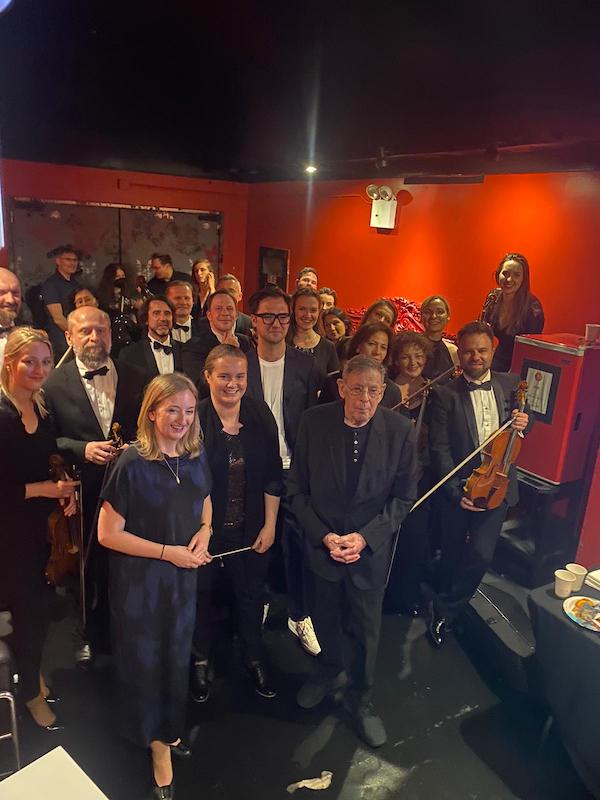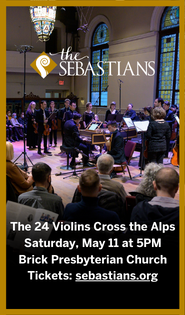Sinfonietta Cracovia goes to the movies with Glass, Kilar

As it turned out, Francis Ford Coppola was the godfather of “Glass-Kilar,” the program of mostly film music given by the excellent Polish string ensemble Sinfonietta Cracovia at (le) poisson rouge Thursday night.
When Coppola needed music for his 1992 film Bram Stoker’s Dracula, he bypassed the Central European symphonic style of Hollywood film scoring, typified by Max Steiner and Erich Korngold, and their successors James Horner and John Williams. It was just too, well, central.
Instead, Coppola went shopping farther east, in the villages and dark forests of the Carpathians, where he encountered the modern yet folk-flavored music of Wojciech Kilar, and knew he’d found his Dracula composer.
Kilar’s music for that film and others, and scores by his near-contemporary Philip Glass, were on the bill Thursday. Playing with energy and precision under conductor Katarzyna Tomala-Jedynak, the group of a dozen-plus players sighed like the wind, pumped out the composers’ shifting rhythms, and filled the dark-walled room with cinematic sound.
Pianist Aleksander Dębicz added evocative keyboard parts where needed, and complemented the motion-picture fare with two of his own compositions.
Besides an interest in film, Glass and Kilar shared a composition teacher—the legendary French pedagogue Nadia Boulanger—and elements of minimalism, with the American Glass influencing his older Polish contemporaries, Kilar and Henryk Górecki.
This influence and that of Bartók could be heard in the first piece on Thursday’s program, Kilar’s Orawa, which the composer described as “inspired by a highlander band.” A country fiddle groove with rhythmic hiccups grew into robust, motoric string patterns, non vibrato, with a plaintive cello melody floating through. An accelerando coda ended in powerful chords and a lusty shout from the players, to the capacity audience’s delight.
Kilar’s successful collaboration with Coppola brought him an invitation to score Jane Campion’s film of the Henry James novel The Portrait of a Lady. For that assignment, the Polish composer did not go full Hollywood, but he did master the indie-film atmospherics of, say, a Merchant/Ivory period film. On Thursday, in the segment titled “A Certain Light,” the strings shaped a sentimental parlor song as the piano’s pearly counterpoints and filigree added highlights.
Glass and Kilar actually had a musical encounter in one film, Peter Weir’s The Truman Show of 1998. At a turning point in the story—the title character’s first encounter with the real world—Glass’s score pauses and a Kilar piece, “Father Kolbe’s Preaching” intervenes.
The performers vividly re-enacted that moment onstage Thursday, as Glass’s sensuous yet ominous murmur of strings and piano gave way to Kilar’s hymn-like string chords, swelling expressively in the manner of Górecki’s celebrated Symphony No. 3.
Although pianist Dębicz titled his first album Cinematic Piano, and his composition “Sideways” appears on it, the piece is unrelated to the 2004 film of that name. Instead, the composer wrote, the title indicated his wish to “get off the beaten track” of classical, jazz and film music. In Thursday’s performance, however, this appealing music, compounded of pattern music in stable harmonies, pretty textures of piano and strings like a Chopin concerto, and the occasional spicy tango rhythm, got good results from staying well within those tracks.
Kilar’s score for Bram Stoker’s Dracula was represented on Thursday by a single excerpt, “The Brides.” This very effective, macabre wedding march made one wonder if Kilar was a fan of TV’s Perry Mason, as the piece’s angular tune and moaning accompaniment seemed to echo Fred Steiner’s iconic show theme almost note for note. Beaten track, or two tracks that converged? One guesses the latter.
Glass composed his Dracula music for string quartet in 1998 to accompany the classic 1931 film with Bela Lugosi, then added a piano part for himself to play on tour with the Kronos Quartet. Performing three excerpts in an arrangement for piano and string orchestra by Michael Riesman, the Polish players brought inevitable comparisons to Bernard Herrmann’s Psycho score with their slashing chords, but later branched out into bright Glassian apreggios and expressive string sonorities. The last excerpt was a study in building complication and excitement without altering the tempo at all, at least until an accelerating coda put an exclamation point on this mini-suite.
Glass’s score for the 2002 film The Hours attracted a lot of attention and an Academy Award nomination. The reason wasn’t hard to tell Thursday night, as pianist Dębicz brought Chopin-like colors to his piano part, pearly in figurations, glistening in chords, and singing in solo lines. The changing textures and fine balances offered more musical rewards than usual for film music performed without the film.
To close the program, Dębicz’s Toccata No. 1, arranged by the composer for piano and string orchestra, fired off the starting line with fast figuration from Bach’s E minor Prelude (The Well-Tempered Clavier, Book I) and never looked back, rolling through passacaglia-like variations that quoted Beethoven, Chopin, and the blues.
The conductor and players rewarded the prolonged applause with three encores: a valse macabre by Kilar from the film The Leper; a piano solo improvisation on Rosemary’s Baby by Krzysztof Komeda, and a repeat of the riotous conclusion (with shout) of Kilar’s Orawa.







